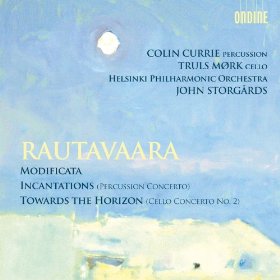RAUTAVAARA Cello Concerto No 2. Percussion Concerto
Newly recorded works by the man Sibelius championed
View record and artist detailsRecord and Artist Details
Genre:
Orchestral
Label: Ondine
Magazine Review Date: 04/2012
Media Format: CD or Download
Media Runtime: 70
Mastering:
DDD
Catalogue Number: ODE1178-2

Tracks:
| Composition | Artist Credit |
|---|---|
| Concerto for Cello No 2, 'Towards the Horizon' |
Einojuhani Rautavaara, Composer
Helsinki Philharmonic Orchestra John Storgårds, Conductor Truls Mørk, Cello |
| Modificata |
Einojuhani Rautavaara, Composer
Helsinki Philharmonic Orchestra John Storgårds, Conductor |
| Percussion Concerto, ‘Incantations’ |
Einojuhani Rautavaara, Composer
Colin Currie, Percussion Helsinki Philharmonic Orchestra John Storgårds, Conductor |
Author: Guy Rickards
Modificata makes an intriguing filler between Rautavaara’s latest, possibly last, pair of concertos. His first concerto was for cello, so there is fitting symmetry in concluding his set with a second (at least so he has declared), luminously scored, with a winning flow of melody, the effortlessness of which is strenuously achieved. In essence, Towards the Horizon (2008-09) is a single-movement set of variations topped and tailed by an Introduction presenting the Theme and a large-scale Finale in which all the threads are drawn together. The near-unbroken line of the cello part, which sings almost without pause, it seems, helps to make the main set of variations in the central span a seamless entity. Given the valedictory nature of the music, the magical close fading out high into the air like a modern retake on The Lark Ascending, there is a temptation to see in this work the composer’s direct contemplation of the infinite – his equivalent perhaps of Shostakovich’s late quartets, but decidedly more positive and serene in expression (yet unblinkingly clear). The Concerto was written for Mørk, who had to pull out of the premiere due to illness; Adam Tesarczyk substituted. Here Mørk proves a dedicated exponent, by turns rapt, athletic and impassioned in his delivery. Korhonen’s claim that Towards the Horizon is the last of Rautavaara’s ‘12 concertos’ is questionable – Ondine themselves previously issued a box-set of the ‘12 concertos’ before the present pair were recorded; but even discarding the brief Ballade for harp and strings, the tally remains 13. (It is unclear which other one should give way: Cantus arcticus, perhaps?)
The Percussion Concerto Incantations (2008) is more dramatic in tone from bar 1, its fast-slow-fast design an orthodox but compelling vehicle for Currie’s blistering virtuosity (the soloist provides his own cadenza, too, in the Animato finale). The evocative title reflects Rautavaara’s belief (to quote Korhonen) ‘that there is much in common between shamanism and composition: a shaman is a mediator between human beings and the hereafter, and a composer too…is more a mediator than a creator’. So one could regard each movement as a spell or incantation conjured between the listener and the otherworld. But whereas in Towards the Horizon there is a specifically personal viewpoint expressed (the composer’s own), in Incantations it is more generalised and with more sense of dialogue. However one may interpret Rautavaara’s title – which, by the way, was selected late in the composition process – the music possesses a powerfully elemental undertow.
This shows itself most clearly in the beautiful central Espressivo, which affords perfectly judged musical and textural contrast after the vigorous opening Pesante and sets up the dance-like finale superbly. Colin Currie, for whom the concerto was written and who premiered it in London in 2009, reprises that scintillating performance in a barnstorming account caught splendidly in Ondine’s superlative sound. John Storgårds and the Helsinki Philharmonic Orchestra give exemplary support in the big-boned textures of both concertos but also shine on their own in Modificata.
This is an immensely noteworthy issue, not as a potential epitaph for Rautavaara the concerto-composer but for the quality of the music-making itself – and sure, let’s hope it does not prove the close of Rautavaara’s career as concerto-composer.
Explore the world’s largest classical music catalogue on Apple Music Classical.
Included with an Apple Music subscription. Download now.

Gramophone Digital Club
- Digital Edition
- Digital Archive
- Reviews Database
- Events & Offers
From £9.20 / month
Subscribe
Gramophone Club
- Print Edition
- Digital Edition
- Digital Archive
- Reviews Database
- Events & Offers
From £11.45 / month
Subscribe
If you are a library, university or other organisation that would be interested in an institutional subscription to Gramophone please click here for further information.






